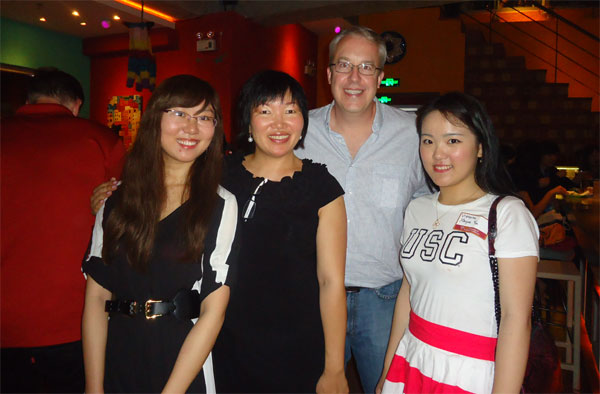USC seeks great minds and real talents
Updated: 2013-06-17 10:06
By Ma Wenying (chinadaily.com.cn)
|
||||||||
Being open to new ideas and a willingness to work together are two basic principles when the University of Southern California (USC) seeks partnerships around the world, director of the university's Beijing office said.
USC now has 29 partnership agreements with Chinese universities. Tsinghua University in Beijing and the USC Viterbi School of Engineering just launched a program this month that will allow selected engineering students to simultaneously earn master's degrees from both institutions, said Joyce Chao, director of the USC Beijing office.
 |
|
Joyce Chao (second from left), director of the USC Beijing office, participated in an alumni reunion held in Beijing on June 5, 2013. [Photo provided to chinadaily.com.cn] |
This program is the latest in a series of global educational programs launched by USC, which maintains eight international offices in Hong Kong, Mexico City, São Paulo, Shanghai, Beijing, India, Seoul, and Taipei. Recent successes include the World Bachelor in Business partnership among USC, The Hong Kong University of Science and Technology, and Bocconi University, which allows undergraduate students to study at and earn bachelor's degrees from all three institutions over the course of four years.
USC is willing to work with top universities around the world, and "great minds meet together to work on research that can influence certain parts of society," Chao said. And in return, these partnerships can enhance the influence of both sides, she added.
USC Beijing office was founded in 2012, the main task of this office is to support university initiatives, build and maintain good relationships with Chinese universities, corporations, and government entities, in conjunction with being the local presence for the bilateral collaborations and on going projects.
USC has been offering scholarships to Chinese students since the 1980s, and it has the largest number of international students among private universities. Located in downtown Los Angeles, California, USC is well-known among overseas Chinese and people in China.
In 2012, 3,038 Chinese students were enrolled at USC, accounting for 38.5% of all international students. They participated in a broad range of programs such as public policy, business, film, and communication.
Most of the Chinese alumni came back to China after graduation, because "the job market in the US is too bad," said Marcus Lyu, who got his MBA from USC in 2003 and now works as head of hard commodities trading Asia at Mercuria Energy Trading (Beijing) Co Ltd.
Lyu's classmate Daniel Wang, who is director of Greater China of Control Risks Group, said the experience at USC was life-changing and all their classmates are at the top level of their careers now. "Before I went to USC, I was doing some business, and I told myself it was time to broaden my horizons and get my career level upgraded," Wang said.
"And the power of USC alumni networks is really helpful. My classmate introduced me to this job, and now I am trying to help younger alumni, too," he added.
That was also an important factor that drew Yang Chenye's attention when she applied for the Master of Public Administration (MPA) program at USC. "The comprehensive ranking of USC is relatively high, and their network of alumni is really powerful," she said. She is going to USC as a freshman at the end of August.
"I hope I can find a job in the US after graduation and come back to China when I get some work experience," Yang said.
But, yes, they will come back, "because right now China is the center of the universe," said Chu Xiaoxing, another alumni of USC.

 Michelle lays roses at site along Berlin Wall
Michelle lays roses at site along Berlin Wall
 Historic space lecture in Tiangong-1 commences
Historic space lecture in Tiangong-1 commences
 'Sopranos' Star James Gandolfini dead at 51
'Sopranos' Star James Gandolfini dead at 51
 UN: Number of refugees hits 18-year high
UN: Number of refugees hits 18-year high
 Slide: Jet exercises from aircraft carrier
Slide: Jet exercises from aircraft carrier
 Talks establish fishery hotline
Talks establish fishery hotline
 Foreign buyers eye Chinese drones
Foreign buyers eye Chinese drones
 UN chief hails China's peacekeepers
UN chief hails China's peacekeepers
Most Viewed
Editor's Picks

|

|

|

|

|

|
Today's Top News
Shenzhou X astronaut gives lecture today
US told to reassess duties on Chinese paper
Chinese seek greater share of satellite market
Russia rejects Obama's nuke cut proposal
US immigration bill sees Senate breakthrough
Brazilian cities revoke fare hikes
Moody's warns on China's local govt debt
Air quality in major cities drops in May
US Weekly

|

|







